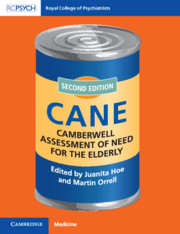Book contents
- Camberwell Assessment of Need for the Elderly
- Camberwell Assessment of Need for the Elderly (CANE)
- Copyright page
- Contents
- Figures
- Tables
- Contributors
- Acknowledgements
- Chapter 1 An Introduction to Needs Assessment and Use of the Camberwell Assessment of Need for the Elderly
- Chapter 2 Self-Reported Needs of People with Dementia Living at Home
- Chapter 3 Needs of Older Primary Care Patients
- Chapter 4 Unmet Needs of Older Persons with and Without Depression in Residential Homes
- Chapter 5 Needs of Older People Living Alone
- Chapter 6 Needs Assessment of People with Dementia and Impact of Caregiver Burden
- Chapter 7 Crisis and Assessment of Need in Dementia
- Chapter 8 Needs of People with Young-Onset Dementia
- Chapter 9 Needs of Older People in Long-Term Care Settings
- Chapter 10 Needs and Healthcare Costs in Old Age
- Chapter 11 The Future of Needs Assessment Research
- Instructions for the CANE
- Index
- References
Chapter 2 - Self-Reported Needs of People with Dementia Living at Home
A Scoping Review
Published online by Cambridge University Press: 10 June 2021
- Camberwell Assessment of Need for the Elderly
- Camberwell Assessment of Need for the Elderly (CANE)
- Copyright page
- Contents
- Figures
- Tables
- Contributors
- Acknowledgements
- Chapter 1 An Introduction to Needs Assessment and Use of the Camberwell Assessment of Need for the Elderly
- Chapter 2 Self-Reported Needs of People with Dementia Living at Home
- Chapter 3 Needs of Older Primary Care Patients
- Chapter 4 Unmet Needs of Older Persons with and Without Depression in Residential Homes
- Chapter 5 Needs of Older People Living Alone
- Chapter 6 Needs Assessment of People with Dementia and Impact of Caregiver Burden
- Chapter 7 Crisis and Assessment of Need in Dementia
- Chapter 8 Needs of People with Young-Onset Dementia
- Chapter 9 Needs of Older People in Long-Term Care Settings
- Chapter 10 Needs and Healthcare Costs in Old Age
- Chapter 11 The Future of Needs Assessment Research
- Instructions for the CANE
- Index
- References
Summary
Demographic changes are associated with an increased number of people with dementia.1 Cognitive communication disorders and reduced ability to use the environment to meet one’s own needs are part of the dementia syndrome.2 The relationship between meeting one´s needs and quality of life is generally accepted.3 Quality of life is a very broad concept with different dimensions which can be approached from many perspectives. Also, needs can be approached from different perspectives: for example, objective and subjective.4 Objective needs can be measured by relevant tools or reported by family or professional carers,5 whereas subjective needs are based on individual feelings and self-perception.6,7 Previous studies have shown that a higher quality of life is related to a lower number of unmet needs.6,8,9 To ensure an adequate quality of life for a person with dementia, it is necessary to focus on meeting their objective as well as subjective needs.
- Type
- Chapter
- Information
- Camberwell Assessment of Need for the ElderlyCANE, pp. 10 - 19Publisher: Cambridge University PressPrint publication year: 2021

